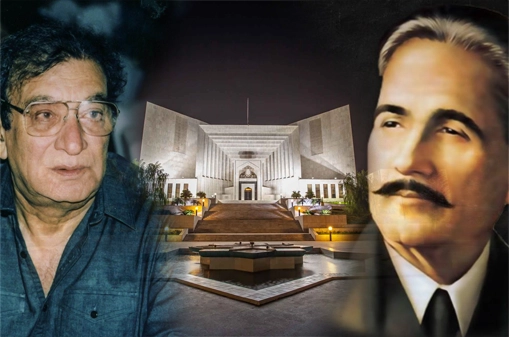- Web Desk
- Feb 19, 2026
Constitutional Bench remembers Ahmad Faraz, Allama Iqbal in military courts hearing
-

- Web Desk Ahsan Wahid
- Feb 27, 2025

ISLAMABAD: The seven-member Constitutional Bench of the Supreme Court, headed by Justice Aminuddin Khan, resumed hearing of the appeal against trial of civilians in the military courts.
Counsel Faisal Siddiqi came to the rostrum to resume arguments on behalf of civil society. He said that the commanding officers filed applications for obtaining the custody of the accused. “The applications began with the words that the initial investigation constitutes an offence under the Official Secrets Act. These words of the application are an admission that the investigation was not completed,” he said.
Military courts trial: custody can only be transferred after indictment, says Siddiqi
The counsel informed the bench that the reasons given by the Anti-Terrorism Court (ATC) for the custody of the accused are “ridiculous”. He said, “The Administrative Judge of the ATC ordered the transfer of the custody of the accused. The ATC found the accused guilty even before the investigation was completed.”
Justice Muhammad Ali Mazhar said, “The wording of the orders of the Rawalpindi and Lahore courts is exactly the same.” Justice Jamal Khan Mandokhail added, “It seems that the judges of the ATCs have a lot of problems with English [language].”
The counsel responded that the court can order the custody of the accused, not the administrative judge. Justice Mazhar concurred that the legal authority to obtain custody of the accused is vested only in the courts.
Siddiqi said, “Under Section 59(1) of the Army Act, military officers can be taken into custody by a civil court in cases of murder and other crimes.” Justice Mandokhail said, “In my opinion, Section 59(4) also applies to those who are subject to the Army Act. [But] taking custody under the Official Secrets Act will be possible only after the investigation is completed.”
The counsel said, “In the cases in which extradition requests were made, the provisions of the Official Secrets Act were not applicable.”
Justice Mazhar added, “In one FIR, the provisions of the Official Secrets Act were also applicable.” To this Faisal Siddiqi responded that he had not seen that FIR in the records.
No right to appeal in a military trial, only mercy appeal to army chief: Bhandari tells court
“Read the FIR in question, the allegation is of vandalism outside a military installation,” Justice Hassan Azhar Rizvi said.
Proceeding with the arguments, lawyer Fasial Siddiqi gave reference to a case when Poet Ahmed Faraz was brought to the court for writing a poem.
He said, “Ahmed Faraz was accused of inciting an army officer through poetry. My father was the doctor of Ahmed Faraz and Faiz Ahmed Faiz. I was also accused of inciting but I was not arrested.”
To this Justice Jamal Khan Mandokhail jokingly said, “We can get you arrested right now.” Faisal Siddiqi responded with similar humor saying, “No one can [touch me] as long as you all judges [are present]”.
Justice Musarrat Hilali, adding to the conversation, said “I remember all the poems of Ahmed Faraz on which case was the case filed.”
She said, “As a lawyer, after losing a case, I used to make a lot of noise in the bar. I used to say that the judges, like truck drivers, turned the indicator on for a different direction and then moved into a different direction.”
Justice Muhammad Ali Mazhar responded to Justice Hilali, “You are doing the same thing as truck drivers by becoming a judge.” Laughter ensued in the court at Justice Mazhar’s words.
Justice Hassan Azhar Rizvi asked Justice Hiali, “Do you also drive a truck?” to which she replied, “I could drive a truck.”
Afterwards, Justice Hilali turned to the civil society’s council and said, “Try to understand my point deeply.” She said, “My father was a freedom fighter, he spent his entire life in prisons. Someone recited my father’s poetry in the Pashtun Jirga a few days ago. The person who recited my father’s poetry in the Jirga was arrested. He then told whose poem it was and who is the poet’s daughter today.”
Justice Hilali said that the person who had recited the poetry was released with great difficulty.
Justice Mandokhail said, “Poetry keeps inspiring or challenging people, it all depends on time”. Justice Hilali added, “Now even the one who writes charsi tikka has to write real charsi tikka.”
At this point, counsel Faisal Siddiqi said, “I hope for the best from all of you judges.” Referring to a coupled by Allama Iqbal, Justice Mandokhail said to the counsel that “you are [the hopeful type]”, saying, “you are Pewasta Reh Shjar Se Umeed e Bahar Rakh type”.
Justice Naeem Akhtar Afghan, addressing the counsel said, “I want to say it in a lighthearted mood. When poet Ahmed Faraz said in a court hearing about a poem that it wasn’t his, Justice Afzal Zullah asked him to pen down a poem that expresses the feelings of the soldiers. To this Faraz said in his defense that he does not have the resources to promote his poems.”
Imran Khan’s lawyer argues against military trials in front of Constitutional Bench
“Today, this is the era of social media. If Ahmed Faraz had been here and had written a poem, he would not have been able to take this defense in this era of social media,” Justice Afghan said.
To this lawyer Siddiqi replied that this is why the courts exist, “to prevent misuse of the law.” He said, “Ahmed Faraz was arrested for writing poetry, but the court gave relief”.
After the lighthearted conversation and Faisal Siddiqi’s arguments, the Constitutional Bench adjourned the hearing of the case until Monday.
Civil society’s lawyer Faisal Siddiqi will continue his arguments in the next hearing.




